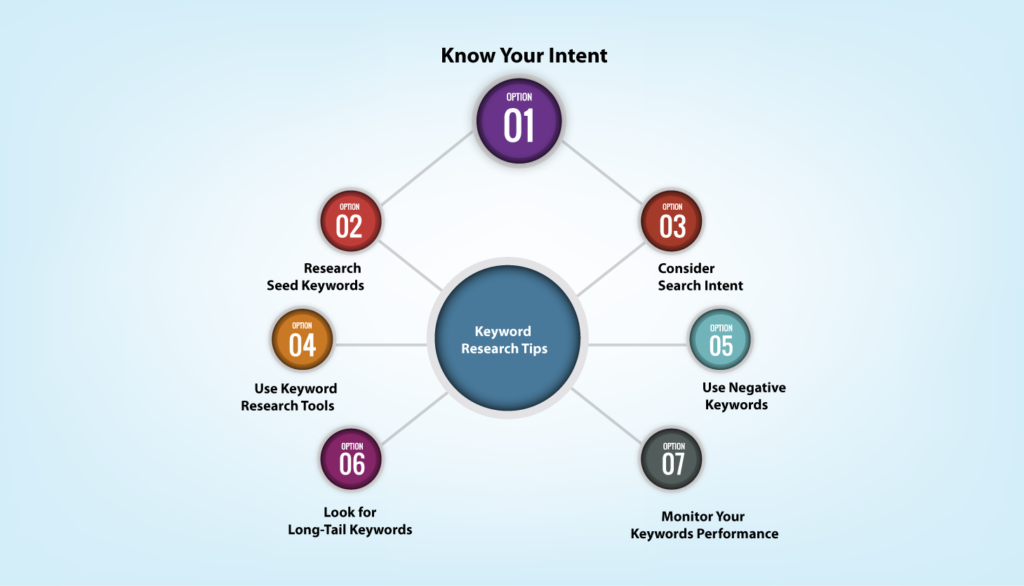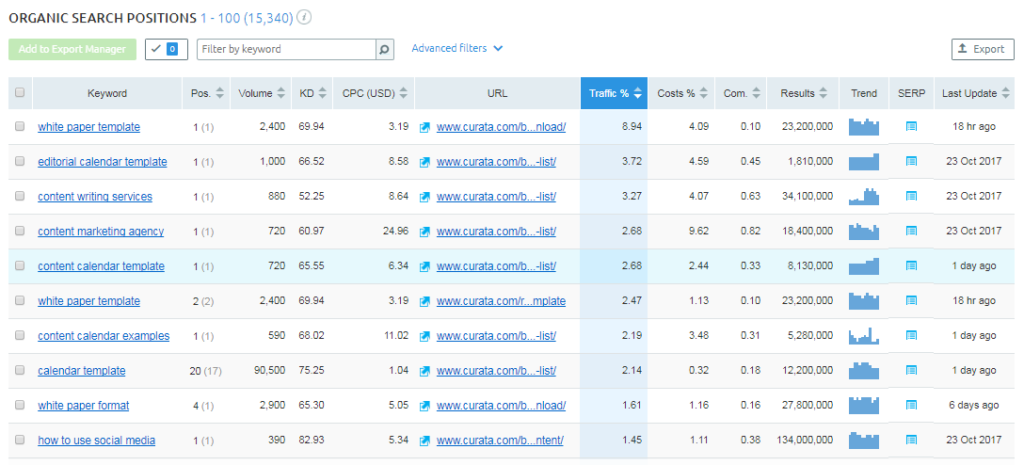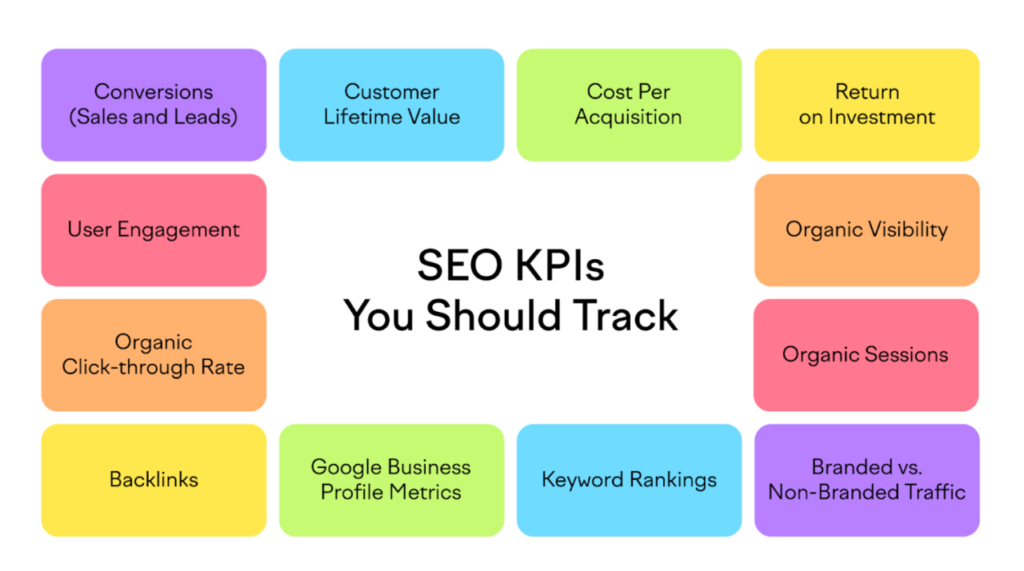Keyword research is the backbone of any successful Pay-Per-Click (PPC) campaign. By identifying the right keywords, you can target the right audience, maximize ad relevance, and achieve higher conversion rates.
In this guide, we’ll explore the essentials of mastering keyword research for PPC campaigns and provide actionable insights to enhance your marketing efforts.
Table of contents
- Understanding the Importance of Keyword Research
- Types of Keywords in PPC
- Tools for Effective Keyword Research
- Analyzing Competitor Keywords
- Prioritizing Keywords Based on Search Intent
- Using Long-Tail Keywords for Higher Conversion Rates
- Implementing Negative Keywords
- Measuring Success with Key Metrics
- Common Mistakes to Avoid in Keyword Research
- FAQ’s
Understanding the Importance of Keyword Research
Effective keyword research allows you to identify the terms and phrases your target audience is searching for. By leveraging these insights, you can create ads that resonate with your audience and appear in relevant search results.

Types of Keywords in PPC
- Broad Keywords: These are general terms that reach a wide audience but may lack specificity.
- Exact Match Keywords: These focus on specific queries, providing higher precision and relevance.
- Long-Tail Keywords: Phrases with three or more words that target a more specific audience, often with higher conversion potential.
- Negative Keywords: Terms you exclude from your campaign to avoid irrelevant traffic.
Tools for Effective Keyword Research
Effective keyword research is crucial for the success of PPC campaigns, and several tools can help streamline this process. Google Keyword Planner is a go-to resource for discovering keyword ideas, assessing search volume, and understanding competition levels. SEMrush excels in providing competitive analysis, revealing keyword difficulty scores, and offering insights into competitors’ strategies. Ahrefs stands out with its robust capabilities for in-depth keyword research and identifying content gaps that can help refine your SEO and PPC strategies.
Google Keyword Planner:
- Google keyword planner Provides keyword suggestions, search volume metrics, and competitive analysis to guide keyword selection.
SEMrush:
- SEMrush Offers insights into keyword difficulty, competitor keyword strategies, and overall competitive landscape.
Ahrefs:
- Ahrefs Enables comprehensive keyword research, including content gap analysis, to uncover opportunities for targeting and optimization.
Analyzing Competitor Keywords
Studying your competitors’ keywords can provide valuable insights into what’s working in your industry. Use tools like SpyFu or SEMrush to uncover competitor keywords and refine your strategy.

Prioritizing Keywords Based on Search Intent
Understanding the intent behind a search query is crucial. Focus on keywords that align with the user’s intent, whether informational, navigational, or transactional. Organize your keywords into tightly themed ad groups. This ensures that your ads are highly relevant to the keywords they’re associated with, improving your Quality Score.
Using Long-Tail Keywords for Higher Conversion Rates
Long-tail keywords may have lower search volumes but often result in higher conversions due to their specificity. Incorporate these into your PPC strategy for more targeted traffic. The digital landscape is constantly changing, so it’s essential to review and update your keyword list regularly. This helps you stay ahead of trends and maintain ad relevance.
Read more About The Power of Long-Tail Keywords In SEO: Unlocking Hidden Gems
Implementing Negative Keywords
Negative keywords prevent your ads from appearing in irrelevant searches, saving you from wasting budget on non-converting clicks. Continuous monitoring allows you to identify underperforming keywords and optimize your campaigns. Use A/B testing to refine your ad copy and keyword selection.
Measuring Success with Key Metrics

Click-Through Rate (CTR):
CTR measures the ratio of users who click on your ad compared to the number of times your ad is shown. A higher CTR indicates that your ad copy and keywords are effectively attracting and engaging your target audience. Monitoring CTR helps assess ad relevance and effectiveness.
Conversion Rate:
This metric shows the percentage of users who complete a desired action (such as making a purchase or filling out a form) after clicking on your ad. A higher conversion rate signifies that your ads are successfully driving valuable actions, reflecting the overall effectiveness of your campaign.
Cost Per Click (CPC):
CPC tracks the average amount you pay for each click on your ad. Managing CPC is essential for controlling your budget and ensuring cost-efficiency, as it directly impacts the overall expense of acquiring traffic and potential customers.
Common Mistakes to Avoid in Keyword Research
In keyword research, avoiding common mistakes is crucial for optimizing PPC campaigns and maximizing return on investment. Overlooking long-tail keywords is a frequent error, as these highly specific phrases often capture more targeted traffic with a higher likelihood of conversion. Neglecting these keywords can result in missed opportunities to reach potential customers who are further along in the buying journey.
Another critical mistake is ignoring search intent; failing to align your keywords with the actual intent behind user searches can lead to ads that don’t resonate with users, increasing bounce rates and decreasing ad relevance. Additionally, failing to use negative keywords can waste valuable ad spend by attracting irrelevant traffic.
By excluding terms that don’t match your target audience’s needs, you can prevent unnecessary expenditures and enhance the effectiveness of your campaigns. Avoiding these mistakes ensures more precise targeting and improved campaign performance.
Conclusion
Mastering keyword research is vital for the success of your PPC campaigns. By selecting the right keywords, understanding search intent, and continually refining your strategy, you can achieve greater ad relevance, lower costs, and higher conversion rates. Implement these strategies to elevate your PPC campaigns and stay ahead in the competitive digital landscape
Readmore : The Fundamentals of Social Media Marketing
FAQ’s
Long-tail keywords are specific phrases with three or more words, targeting a narrower audience, often resulting in higher conversion rates.
Negative keywords prevent your ads from appearing in irrelevant searches, saving budget and increasing ad relevance.
Understanding search intent helps align your ads with what users are actually looking for, improving relevance and conversion rates.
Regularly update your keyword list to stay current with trends and maintain ad relevance, ideally reviewing it monthly.

Smith
Welcome to my blog! As an Digital Marketing expert with over 15 years of experience, I’ve witnessed the transformative power of search engine optimization from the very beginning of my career. In this blog series, I’ll delve into the crucial role SEO , marketing plays in the success of small businesses. Join me on this journey to uncover how leveraging data-driven insights and innovative SEO techniques can propel your small business to new heights, attract a broader audience, and drive sustainable growth in the digital age. Whether you’re a seasoned entrepreneur or just starting out, you’ll find valuable insights and practical tips to enhance your Digital Marketing strategies.


